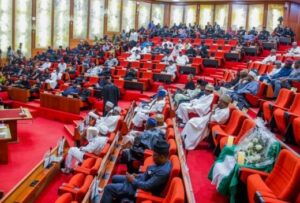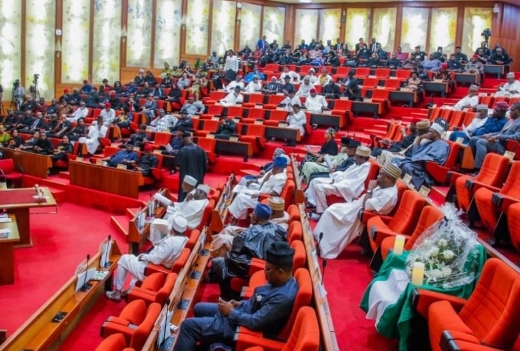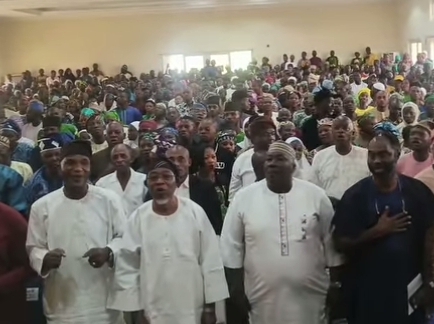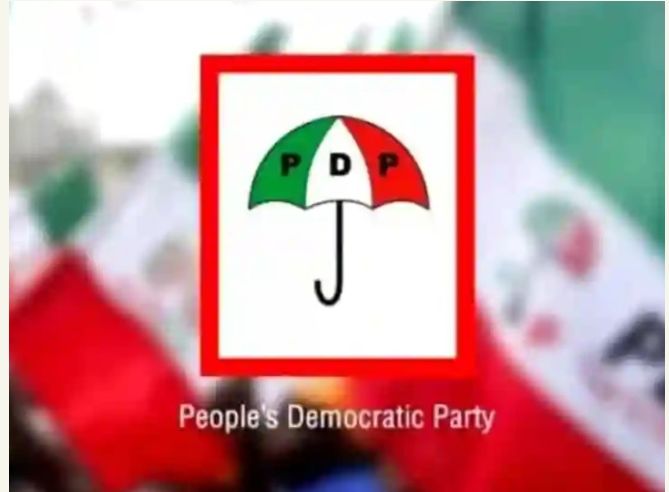Senate Session Erupts in Chaos as Tax Reform Debate Provokes Heated Disputes

The Senate witnessed a dramatic disruption on Wednesday as a discussion on federal tax reform sparked fierce disagreements over procedural issues and legislative integrity. The tension arose after Senate leadership allowed a team of government officials behind the proposed tax reform bills, which include tax breaks for vulnerable populations, to address lawmakers in the chamber.
The controversy began when Senate Leader Opeyemi Bamidele informed the chamber that several visitors would be entering to present details of the tax reform initiative. Bamidele, speaking during a session chaired by Deputy Senate President Jibrin Barau, invoked Senate Order 12(1), requesting the suspension of chamber rules to permit the visitors to address the Senate.
Among the visitors were key figures from the tax reform team, including the Chairman of the Federal Inland Revenue Service (FIRS), Dr. Zacch Adedeji; Director General of the Budget Office, Tanimu Yakubu; and Mr. Taiwo Oyedele, Chairman of the Presidential Committee on Fiscal Policy and Tax Reforms.
Bauchi Central Senator Abdul Ningi raised an objection, pointing out that the invited guests were not listed in the Senate rules as eligible to address the chamber, citing a breach of procedural guidelines. Ningi referenced Order 12 of the Senate rulebook, which defines who can be admitted to the chamber.
In response, Bamidele explained that he had specifically requested the suspension of the rules to allow the guests entry, a point of clarification that was upheld by Deputy Senate President Barau. Barau emphasized that the visitors’ purpose was to clarify the details of the controversial tax reforms to avoid misinformation among the public.
Despite Bamidele’s motion being seconded by Minority Leader Abba Moro, the situation escalated when former Senate Chief Whip, Senator Mohammed Ali Ndume, vehemently objected to the move. Ndume argued that the Tax Reform Bill was not on the day’s Order Paper, and as per Senate rules, issues not included on the Order Paper cannot be discussed without the proper procedural amendments.
“This is an important issue, and we must adhere to the rules,” Ndume stated, warning that bypassing the protocol could erode the Senate’s credibility. He argued that the tax reform bill, which directly impacted Nigerians, warranted careful consideration and should not be rushed or manipulated.
Ndume emphasized that, while he was not opposed to the visitors speaking, the Senate needed to ensure all procedures were followed. “If this bill must be addressed today, a supplementary Order Paper should be issued,” he insisted. He stressed that the matter was of immense national importance and should not be handled casually.
In his passionate appeal, Ndume reminded the Senate of their sworn duty to represent the people’s interests, citing public concerns over the tax reforms and the need for transparency. “We swear by the Bible and the Quran to represent the interests of Nigerians. This is not a matter to be taken lightly,” he added.
However, Barau defended the decision to allow the visitors to speak, dismissing Ndume’s objections as rhetorical and emphasizing that the Senate was acting in accordance with its rules. He ruled Ndume out of order, further intensifying the already volatile atmosphere in the chamber.
Barau’s remarks sparked further disorder, with senators shouting over each other. In an attempt to restore calm, Barau insisted that the Senate was not engaged in rhetorical debates, but rather, focused on “facts.”
After the heated exchange, the government officials were allowed to proceed with their presentation. They outlined the four key pieces of legislation involved in the proposed tax reform: the Nigeria Tax Bill, the Nigeria Tax Administration Bill, the Nigeria Revenue Service Establishment Bill, and the Joint Revenue Board Establishment Bill.
The officials explained that these bills aimed to overhaul Nigeria’s tax system, consolidating various tax regulations under a more efficient structure. They emphasized that the reforms were designed to benefit low-income earners and small businesses by exempting them from income taxes, positioning the bills as pro-poor, pro-growth, and pro-efficiency.
In conclusion, the tax reform team urged the Senate to support the passage of the bills to help drive national economic progress and ensure a more equitable tax system for all Nigerians.



